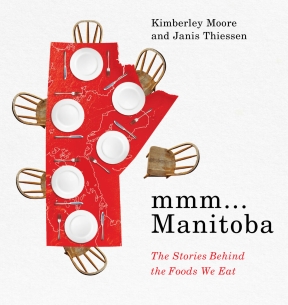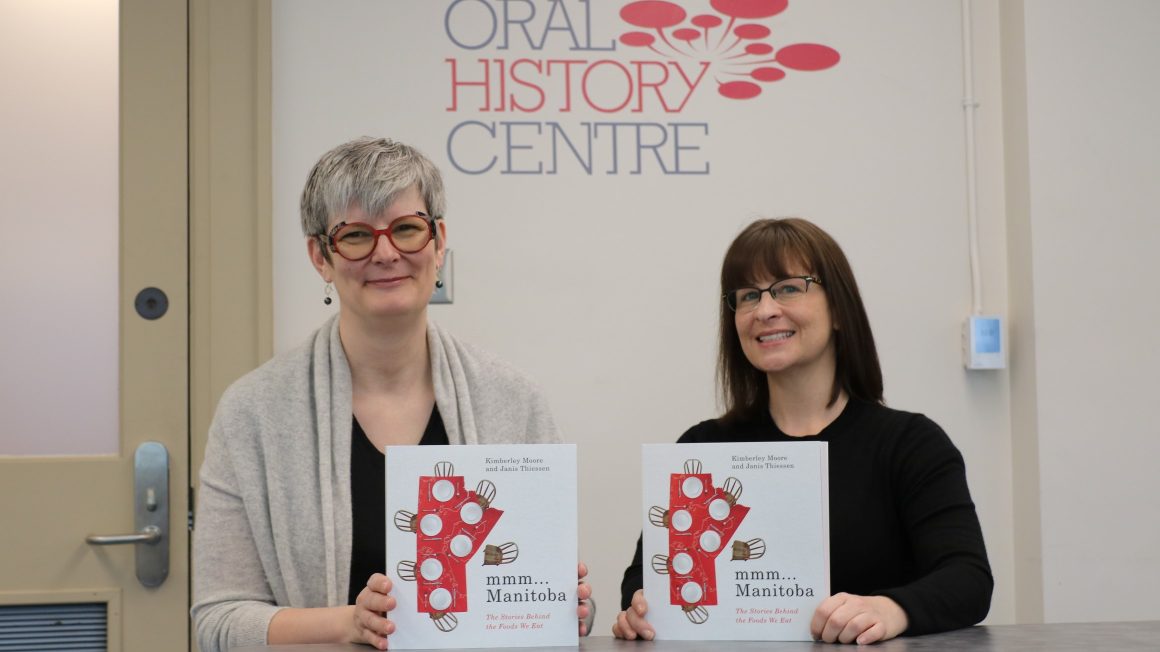The latest addition to the University of Winnipeg bookshelf is one many readers will want to devour.
mmm…Manitoba: The Stories Behind the Foods We Eat by Kimberley Moore and Janis Thiessen is available now from University of Manitoba Press. A free excerpt is also available online.
Copies will also be available at a book launch event this Wednesday, April 17 at 7:00 p.m. at the Manitoba Museum (190 Rupert Avenue). Moore and Thiessen will be on hand for a reading and signing.
One of our goals for the book—and for the Manitoba Food History Project as a whole—was to add to the understanding of what ‘food production’ means.
Kimberley Moore and Janis Thiessen
mmm…Manitoba offers readers an irresistible blend of stories, recipes, maps, archival records, biographies, and photographs that showcase the province’s diverse food histories. Chapters cover food security and regulation, Indigenous foodways and agriculture, capitalism’s impact on the agri-food industry, and the networks between food producers and retailers. The book also explores the roles of gender, ethnicity, migration, and colonialism in Manitoba’s food history.
Moore, Adjunct Professor and Programming and Collections Specialist at UWinnipeg’s Oral History Centre, and Thiessen, Professor in the Department of History, logged many miles in the Manitoba Food History Truck to compile the interviews and recipes sandwiched between the covers of mmm…Manitoba.
The COVID-19 pandemic provided them with an opportunity to sift through and reflect on the stories and recipes they had collected and compile them into a book that will broaden readers’ assumptions about food in the Keystone Province.
“As a prairie province, there is a tendency to associate food history here with agriculture, and the deeply engrained perception of Manitoba as Canada’s ‘breadbasket,’” Moore and Thiessen said. “One of our goals for the book—and for the Manitoba Food History Project as a whole—was to add to the understanding of what ‘food production’ means. So, we explored food production in contexts like Indigenous farming practices past and present, in households and communities, and in industries beyond farming like the restaurant industry, and cottage industries such as perogy-making.”
One of their guiding principles is that “food has a social life.”
“Often, what we enjoy about certain foods, and what they mean to us, extends beyond our personal lives and preferences,” Moore and Thiessen said. “For example, the reason we love Fat Boys, or feel nostalgia and comfort in restaurants like Kelekis’ or Salisbury House, isn’t just because we as individuals like to eat a particular food from a particular place. Elements of community, identity, and belonging are found in restaurant booths, and gained along with the perogies we buy from our local perogy ladies or at fundraisers.”
The book is just one outcome of the multi-year, SSHRC-funded Manitoba Food History Project, whose goal is to produce a comprehensive history of food manufacturing, production, retailing, and consumption in Manitoba from 1870 to the present.
QR codes embedded in the book connect readers to other aspects of the Manitoba Food History Project, the most visible aspect of which is the award-winning Manitoba Food History Truck, which hit the road in 2018.
Manitobans from across the province stepped aboard the mobile research station to share family recipes, favourite dishes, fond memories, and personal stories, now archived at the Oral History Centre, that inform understandings of the history of Manitoba. Many have been produced as podcasts, soundscapes, ArcGIS story maps, and more.
The trips left the authors with many memories of their own. Moore recalled a 2019 rainstorm that forced her, Thiessen, and collaborator Kent Davies to take cover in the truck’s cab, only to discover the roof had a leak.
Thiessen recalled taking the train to Churchill and observing the important role the train plays in northern Manitoba communities.
“I will never forget the regret (and hunger) I felt when I realized that regular travellers knew when to phone Thompson to order their pizzas delivered by taxi to the train station,” she said. “The smell of those pizzas as we continued on to Winnipeg was so amazing!”



